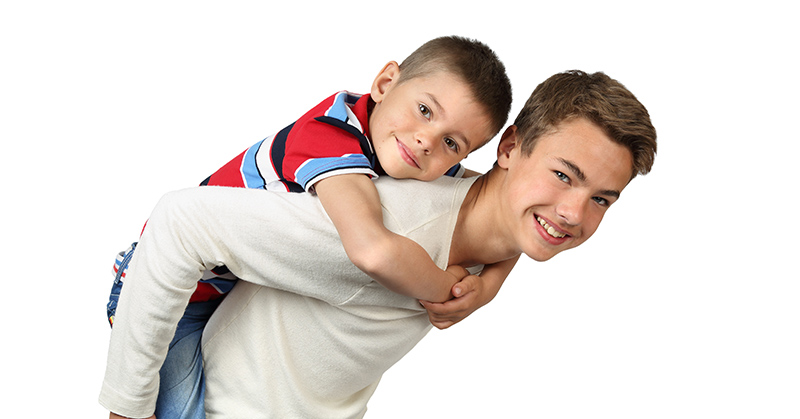Turns out when your older sibling jokes around that they are the older and therefore wiser sibling, they might actually be right. A study found that older siblings are, in fact, more academically inclined than their younger counterparts.
Science Says Your Older Sibling Is Smarter
The study, which was published in the Journal of Human Resources found that starting from early infancy, firstborn children out-perform their younger siblings on cognitive tests. Turns out this is incremental, in that the further down the sibling line you are, the less well you perform on these tests. (1, 2, 3, 4)
The study followed4850 children and assessed them every two years from pre-birth until age 14. What they found was that the older siblings, particularly the first-borns, are better set up for academic success because of the type of parenting they receive. (1, 2, 3, 4)
Parents are the Cause?
Now let’s be clear: we are not blaming parents or telling them they are bad. The reality is, the first time you have a child, you are scared and stressed. The typical first-time-parent response is to try to do everything perfectly. Starting from mothers being more strict with their habits during pregnancy, to parents spending more time reading, doing crafts, and playing other mentally stimulating games with their child, this all tends to relax with subsequent kids. According to research co-author Jee-Yeon K Lehmann, this is not really surprising. (1, 2, 3, 4)
“First-time parents tend to want to do everything right and generally have a greater awareness of their interactions with and investments in the firstborn,” he told NBC’s “TODAY.” “With each subsequent child, parents tend to relax to a greater extent what they might deem as non-essential needs for their kids.” (3)
There are many reasons behind this (1, 2, 3, 4):
- First time parent jitters (both during pregnancy and after birth)
- Mothers more likely to smoke or drink during pregnancy
- Mothers less likely to breastfeed subsequent children, if at all
- Time becomes divided between multiple children
- Resources become divided between children
- Latter-born kids less likely to receive intellectual toys and games
Essentially, the more children a parent or set of parents has, the less worried they are and the more their time and attention needs to be divided. With less time to spend individually with their younger children, the more things like reading time and mental stimulation are cut out.
The Result
The research shows the impact this has on the younger children. Long before the kids start school, they are already showing decreased intellectual performance. By age one, younger siblings show less progress in reading, letter matching, and picture vocabulary tests. The dichotomy between the siblings shows even more when math testing is included. (1, 2, 3, 4)
Some of this may be attributed to a lack of academic confidence seen in younger siblings versus their older sister or brother. (1, 2, 3, 4)
This all correlates to other studies done on siblings, which have shown older siblings (3):
- Have a one or two point higher IQ than younger siblings
- Are 30% more likely to become CEOs or Politicians
- Are 7% more likely to want to complete further education
Younger siblings are also more likely to underestimate their own intelligence and more likely to follow their older sibling’s lead than forge their own path. (1, 2, 3, 4)
What Can Parents Do?
While it is good for parents to feel less stressed having a second child than when they had their first, it is important that they put the same effort into their learning and development. Taking time each day to work individually with their younger child and teach them things the same way they did their older child will make a big impact. With each child a parent has, they should prioritize (1, 2, 3, 4):
- Reading with that child
- Teaching the child things like alphabet, handwriting, counting, etc.
- Maintaining healthy practices during pregnancy and breastfeeding
- Providing intellectually stimulating games, toys, and activities for their child
- Spending one-on-one time with each child so that they learn to think, act, and make decisions for themselves
Prioritizing each child’s development as if they were your first or only child will have an incredible impact on each one of your children’s confidence and intellectual capabilities.
Keep Reading: Sandra Bullock nailed why we should stop saying ‘adopted child’
Sources
- “Science Confirms Your Older Sibling Is Probably Smarter Than You.” Mens Health. Alisa Hrustic.
- “ELDEST SIBLINGS ARE MORE INTELLIGENT, STUDY CLAIMS.” Independent. Rachel Hosie.
- “Oldest children are the smartest, research shows.” CNBC. Kerri Anne Renzulli.
- “The Early Origins of Birth Order Differences in Children’s Outcomes and Parental Behavior.” JHR. Jee-Yeon K. Lehmann, et al.

